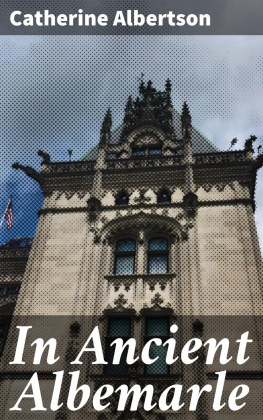CHAPTER I
Table of Contents
WIKACOME IN WEAPOMEIOK, THE HOME OF GEORGE DURANT
In Perquimans County, North Carolina, there lies between the beautiful Perquimans River on the west, and her fair and placid sister, the Katoline or Little River, on the east, a lovely strip of land to which the red man in days long gone, gave the name of Wikacome. The broad sound whose tawny waters wash the southern shores of this peninsula, as well as all that tract of land lying between the Chowan River and the Atlantic Ocean, were known to the primitive dwellers in that region as Weapomeiok.
Not until George Durant came into Carolina, and following him a thin stream of settlers that finally overflowed the surrounding country, did the beautiful Indian names give place to those by which they are now known. Then Wikacome became the familiar Durant's Neck, and the waters of Weapomeiok and the territory known to the aborigines by the same name, changed to the historic cognomen of Albemarle.
George Durant and Samuel Pricklove were the first of the Anglo-Saxon race to establish a permanent settlement in Wikacome, though they were not the first Englishmen whose eyes had rested upon its virgin forests and fair green meadows, for in the early spring of 1586 Ralph Lane, who had been sent with Sir Richard Grenville by Sir Walter Raleigh to colonize Roanoke Island, set out with fourteen comrades from that place on an exploring expedition, hoping to find the golden "Will-o'-the-Wisp," which led so many English adventurers of the day to seek their fortunes in the New World.
As far as the Roanoke River sailed the bold explorer and his comrades, among whom were Philip Amadas and the historian Hakluyt. To the south as far as Craven County they pushed their little boat, and northward to the shores of Chesapeake Bay. In the course of their journey they touched at Chepanock, an Indian village lying at the extremity of Durant's Neck. And Lane relates that on his return trip he stopped again at that point to secure a supply of provisions, and to fish in the sound.
It was Easter morning, 1586, when Lane and his hardy sailors, worn out from their rough voyage down the Chowan and up the tawny waters of the sound, sailed into the quiet harbor of the Katoline River. Half starved, for the hostile tribes of the Mangoaks on the Chowan River, after being repulsed in an attack upon the strangers, had refused to sell them food, Lane and his men, for two days without means of staying their hunger, hoped to buy from the Indians of Weapomeiok the provisions so sorely needed.
But when the little band of explorers rowed their small craft to the shore, and set out in search of corn and meat, they found the wigwams of Chepanock deserted, and no sign of the red men. The Indians doubtless had been alarmed at the sight of the strangers when they first stopped at the village, and had fled from their homes to the interior of the country.
No corn nor meal could Lane procure, but the weirs were full of fish, and the men were able to satisfy their hunger, and having rested at Chepanock that night they returned to Roanoke Island next morning. When the plash of their oars died away in the distance, the waters of the Katoline and the northern shores of Weapomeiok knew the white man's sails no more until over half a century had passed away.
Lane and his colony, discouraged in their hopes of finding gold, and disheartened by the many misfortunes that had befallen them, sailed back to England with Sir Francis Drake. Raleigh's second attempt a year later to establish a colony on Roanoke Island ended in the pathetic story of little Virginia Dare and the "Lost Colony." Queen Elizabeth died, and the tyrannical reign of James I came to an end. Charles I and Cromwell waged their bitter war; the Commonwealth and Protectorate ran their brief course, and the Restoration of 1660 brought back the third of the Stuarts to the throne of England.
During all these changes in the ownership of Carolina and her sister colonies, the red man roamed unmolested through the forests of Wikacome and fished the weirs in the silver streams flowing into the broad waters of Weapomeiok, unafraid of the great, white-winged boats of the pale face. These brief visits to his shores were now remembered only when the tribes gathered around the great camp fires at night, and listened to the tales told by ancient braves and squaws, to whom the appearance of the swift ships of the strangers now seemed only a dim, half-remembered dream.
But as the years rolled by, venturesome hunters and trappers from Virginia began to thread their way through the tangled woods of the region lying to the south of the Chesapeake. Returning to their homes they carried with them glowing accounts of the mild climate, the placid streams teeming with fish, the wild game and rich furs to be found in the country through which they had wandered.
In 1630 Sir Robert Heath, to whom Charles I granted a large portion of Carolina, attempted to establish a settlement in the territory. Later Roger Green, an English clergyman, made a similar attempt near the present town of Edenton, but both these efforts failed. However, the spirit of discovery and adventure was now fully aroused, and by 1656 a number of settlements had been established along the shores of the streams that flow into Albemarle Sound. Of none of these, however, can any accurate account be given, their date and location having long been forgotten; and not until 1661 is there any authenticated record of a permanent settlement in North Carolina.
A year or two previous to that date, George Durant, a planter from Virginia, attracted by the enthusiastic accounts he had heard of the desirable lands to be found lying to the south, started out on an exploring expedition to see for himself if all he had heard of the Indian land of Weapomeiok were true, intending, if the country came up to his expectations, there to establish his home.
For nearly two years Durant journeyed through the country, and finally satisfied that the glowing accounts he had heard were not exaggerated, he determined to bring his wife and family, his goods and chattels, into this new "Land of Promise," and there build for himself a house to dwell in, and to clear away the forest for a plantation. The first spot selected by him for his future home was very near the ancient Indian village of Chepanock, on the peninsula of Wikacome, which juts out into the wide waters of Weapomeiok, and whose shores are watered by the Katoline and the Perquimans rivers.
With the coming of George Durant to Carolina, the old Indian name Wikacome vanishes from history, and "Durant's Neck" becomes the name by which that section is henceforth known. The sound and the region north of it, first known as Weapomeiok, change to Albemarle; and the Katoline River soon loses its Indian designation, and is known to the settlers who made their homes on its banks as the "Little River."
With the establishment of George Durant on the peninsula now called by his name, the connected history of North Carolina begins. And it is a matter of pride to the citizens of the Old North State that our first settler, with a sturdy honesty and a sense of justice shown but seldom to the red man by the pioneers in the colonies, bought from the Indian chief, Kilcokonen "for a valuable consideration" the land on which he established his home. The deed for this tract of land is now in the old court-house in Hertford, North Carolina, and is the earliest recorded in the history of our State. The following is an exact copy of this ancient document:










